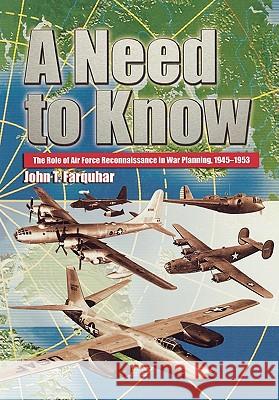A Need to Know: The Role of Air Force Reconnaissance in War Planning, 1945-1953 » książka
A Need to Know: The Role of Air Force Reconnaissance in War Planning, 1945-1953
ISBN-13: 9781780392028 / Angielski / Miękka / 2011 / 236 str.
More than a tool of policy makers to gather intelligence, Air Force reconnaissance efforts shaped early Cold War doctrine and war planning. Dr. Farquhar argues that a lack of information on Soviet strategic capabilities dominated the organization, operational planning, and equipment of the postwar Air Force. To support his assertion, Farquhar traces the development of aerial reconnaissance from the first balloon ascents through World War II as a prelude. He then examines early Cold War peripheral reconnaissance and overflights of the Soviet Union. He explains the evolution of intelligence-gathering technology, bureaucratic growth, and a relative lack of attention paid to electronic warfare before the Korean War. Based primarily on archival sources, this book (first published in 2004) serves as an excellent reference for air doctrine, intelligence, and electronic warfare in the formative years of the Cold War.
More than a tool of policy makers to gather intelligence, Air Force reconnaissance efforts shaped early Cold War doctrine and war planning. Dr. Farquhar argues that a lack of information on Soviet strategic capabilities dominated the organization, operational planning, and equipment of the postwar Air Force. To support his assertion, Farquhar traces the development of aerial reconnaissance from the first balloon ascents through World War II as a prelude. He then examines early Cold War peripheral reconnaissance and overflights of the Soviet Union. He explains the evolution of intelligence-gathering technology, bureaucratic growth, and a relative lack of attention paid to electronic warfare before the Korean War. Based primarily on archival sources, this book (first published in 2004) serves as an excellent reference for air doctrine, intelligence, and electronic warfare in the formative years of the Cold War.











